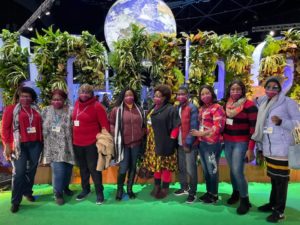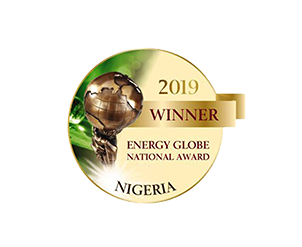
COP26 OUTCOMES: OUR REFLECTIONS: CLIMATE CHANGE CONFERENCE FROM THE STANDPOINT OF WOMEN ENVIRONMENTAL PROGRAMME (WEP) GLASGOW, SCOTLAND UNFCCC COP26 31ST OCTOBER-12TH NOVEMBER 2021

Women Environmental Programme (WEP) as an accredited Civil Society organization with the United Nations Framework Convention on Climate Change (UNFCCC) has since 2010 participated in the UN Conference of Parties of the UNFCCC joining forces with other CSOs across the world to bring their voices to the negotiations and decisions of the member states otherwise known as parties in various thematic areas of negotiations.
- Women Environmental Programme (WEP) participation to the 26th session of the Conference of Parties (COP 26) to the United Nations Framework Convention on Climate Change (UNFCCC), held in Glasgow from 30th October 2021 to 12th November 2021 was led by our Global President, Dr. Priscilla M Achakpa specific expectations taken from the Nigeria’s national position, the African CSO and that of the African Group of Negotiators position and aligning with those of the Women and Gender Constituency in which WEP plays a strategic role.
- From the perspectives of our organization, our expectations from the conference has fallen short as we had expected a negotiations with full commitment to human rights, delivering on financial commitments by the promises of the developed countries, ensuring ecosystem integrity, advancing the Gender Action Plan, rejection of false solutions and investment in gender-just climate solutions, ensuring right to water and sanitation in all climate actions, and ensuring women’s land rights among others. Some of the decision on subsidiary body for implementation (SBI26) on Gender were watered down and non-binding such as “Reminding Parties of the encouragement to appoint and provide support for a national gender and climate change focal point for climate negotiations, implementation and monitoring and noting that 94 countries have appointed such a focal point to date”
- In addition to the above demands, Women Environmental Programme (WEP), prior to the climate change conference, held a consultative meeting among women’s groups, civil society organizations and persons with disabilities in Nigeria and agreed on what they expected from Parties at the climate change conference and what the Federal Government of Nigeria and other stakeholders should do to address climate change impacts on vulnerable populations. WEP also expected to see ambitious actions by countries to cut down greenhouse gases emissions, especially from coal, as recommended by the Intergovernmental Panel on Climate Change (IPCCC) in its 2021 report.
- Most of the World Leaders during their Summit at the beginning of the conference, announced increased ambition to cutting down emissions or committing more resources to the climate fund. We hope to see these commitments translate into actions and programs that will conserve and preserve our planet through nature-based solutions. The World Leaders Summit pave way for the 2 weeks negotiations of the core agenda items and other parallel meetings and side events.
- Some of the outcomes of the conference are:
- COP26 resulted in the completion of the Paris Agreement rulebook as again the previous COP25 in which several issues in the Paris Rule Book were still pending such as; carbon markets, length of timeframe for NDCs, global stock-take, adaptation, climate finance plans among other issues. However, with Paris Agreement Rulebook, we hope that the Paris targets will be kept alive, thus giving us a chance of limiting global warming to 1.5 degrees Celsius.
- A decision to phase-down unabated coal power.
- A call for developed country “Parties to urgently and significantly scale up their provision of climate finance, technology transfer and capacity-building for adaptation so as to respond to the needs of developing country Parties as part of a global effort, including for the formulation and implementation of national adaptation plans and adaptation communications.”
- After four years of negotiations, countries meeting at COP26 finally reached a deal on Article 6 of the Paris Agreement, which covers international cooperation including carbon markets. Parties agreed to the “carryover” of carbon credits generated under the Kyoto Protocol since 2013, bringing up to 320mtonnes of CO2 equivalent (MtCO2e) into the Paris mechanism.
- A new fund dedicated for loss and damage could not be set up as pushed for by vulnerable countries. Parties agreed that the Santiago Network, a new body created at COP25 in 2019 should further the work of the Warsaw International Mechanism for Loss and Damage Associated with Climate Change Impacts (WIM). The Santiago Network will provide a platform for countries and organizations to identify and catalyze opportunities to mobilize technical assistance to address loss and damage resulting from climate change.
- Parties also agreed on a common timeframes for Nationally Determined Contributions: “Encourages Parties to communicate in 2025 a nationally determined contribution with an end date of 2035, in 2030 a nationally determined contribution with an end date of 2040, and so forth every five years thereafter.”
- There was increased momentum to put gender at the forefront of climate actions. UK announced a commitment of £165m of fundingfor two programmes to advance gender equality while talking climate change. US announced $14m towards the Gender Equity and Equality Action Fund while Canada committed to ensure that 80% of climate finance pledges over the next five years would target gender equality. Nigeria pledged to expand on its implementation strategy for its National Action Plan on Gender and Climate Change. These were among other announcements committing to gender equality in climate actions.
- Other key outcomes of COP26 are:
- A pledge by over 100 countries to cut back planet-heating methane
- Commitment to phase out coal power
- Commitment to halting all financing for fossil fuel development overseas and diverting the spending to green energy.
- The COP26 presidency team announced a new declarationon “accelerating the transition to 100% zero-emission cars and vans.”
- The launch of the Glasgow Financial Alliance for Net-Zero(GFANZ), which said its members – some 450 firms in 45 countries – had committed $130tn towards the net-zero transition.
- COP26 did not achieve all expectations regarding cutting down greenhouse gas emissions and supporting vulnerable countries that have suffered loss and damage from the adverse effects of climate change. We hope that the Santiago Network that is furthering the work of the Warsaw International Mechanism (WIM) will be funded to support vulnerable communities suffering loss and damage from climate change impacts.
- It is debatable if the carbon markets agreed on by the Parties will be able to effectively achieve emission reduction, just like there are doubts about climate solutions peddled by some countries and corporations, which are considered to be false solutions and opposed by Women and Gender Constituency and other civil society groups. Judging from experience of failing to implement commitments to climate action by developed countries, we cannot applaud now, commitments made at COP26 until they are fully fulfilled.
If the Parties do not act fast on their commitments, the world will be heading towards “…an increase of about 16% in global GHG emissions in 2030 compared to 2010 …” as projected in the NDCs Synthesis Report, 2021. “Such an increase in emissions translates to a global average temperature rise of about 2.7°C by the end of the century.”
- While we are happy that there was momentum to put gender at the forefront of climate actions and commitments made by some countries, it is left to be seen how the commitments will translate to actions.
- Our Recommendations
- We call on governments to be more explicit about the gender-responsiveness of climate finance with a view to strengthening the capacity of women and furthering work under the gender action plan in order to facilitate access to climate finance for grassroots women’s organizations as well as for indigenous peoples and local communities;
- Gender budgetary allocations in national governments is key to ensuring that gender and climate change issues are taken very serious by governments.
- We recommend that countries should consider gender issues in all their climate actions and programmes
- Every country has a duty to develop their gender action plan on climate change and also its implementation framework which they have signed up to in the UNFCCC GAP.
- We recommend gender-just climate solutions, that are beneficial to all, and to the environment.
- Like a coin that must have two sides, COP26 has presented its two sides – positive and negative. On whatever side you are, you have the opportunity to engage, the positive to make it better and the negative to change it to positive.
WEP commits to collaborating with all stakeholders, the private sector, CSOs and government at all levels towards delivering on her mandate and take this opportunity to thank the Nigerian Government for creating an enabling environment to strive. Our national and international partners, our networks, Women and Gender Constituency, CSDevNet, WECF, WEDO and all others, we say this is the time to work collaboratively in delivering to the most marginalized communities and people.


